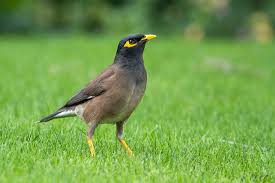
Mynah
Conditions of detention
Mynah birds require a spacious cage or aviary that allows for ample movement and flight. The enclosure should be equipped with perches, toys, and enrichment activities to keep them mentally stimulated. It’s important to place the cage in a well-lit area away from drafts and direct sunlight.
Useful Fact: Mynah birds are active flyers and benefit from a large cage or aviary that allows them to stretch their wings and move freely. They also enjoy supervised out-of-cage time to explore their surroundings.
Nutrition and diet
Mynah birds have a specialized diet that is different from many other pet birds. They require a diet high in fruits and soft foods, with minimal seeds. Commercial mynah pellets are available and should be supplemented with fresh fruits such as apples, bananas, berries, and grapes, as well as vegetables like carrots and leafy greens.
Useful Fact: Mynah birds are prone to iron storage disease, so it’s important to provide a diet low in iron and avoid foods high in this mineral, such as spinach and red meat.
Health
Mynah birds are generally healthy but can be prone to certain health issues such as iron storage disease, respiratory infections, and obesity. Regular veterinary check-ups and a balanced diet are crucial for maintaining their health.
Useful Fact: Monitor your mynah’s droppings for any changes in color or consistency, as these can be indicators of health problems that require attention.
Grooming and care
Mynah birds groom themselves by preening their feathers and enjoy bathing. Providing a shallow dish of water for bathing or misting them lightly with water can help maintain healthy feathers.
Useful Fact: Regular cleaning of their cage is essential due to their messy eating habits and watery droppings, which can accumulate quickly.
Education and training
Mynah birds are intelligent and can be trained to mimic sounds, words, and perform simple tricks. Positive reinforcement and patience are key to successful training.
Useful Fact: Mynah birds are excellent mimics and can learn a wide variety of sounds, including human speech, with consistent training and interaction.
Toys and entertainment
Toys are essential for keeping mynah birds entertained and mentally stimulated. They enjoy a variety of toys, including those that encourage exploration and manipulation.
Useful Fact: Mynahs are curious and enjoy exploring their environment, so providing toys that encourage foraging and problem-solving can help prevent boredom.
Safety
Safety considerations include ensuring that the cage is free of sharp edges and that the bar spacing is appropriate to prevent escape or injury. Keep them away from toxic substances, including certain household plants and fumes.
Useful Fact: Avoid using non-stick cookware around mynah birds, as the fumes can be toxic and even fatal to birds.
Accessories
Mynah birds require a variety of accessories for their cage, including perches, food and water dishes, and toys. Accessories should be made from safe materials like stainless steel or ceramic.
Useful Fact: Mynah birds need sturdy perches that can support their weight and provide a comfortable grip, as they are relatively heavy-bodied birds.
Socialization
Mynah birds are social creatures and thrive on interaction with humans and other birds. They should not be kept in isolation for extended periods.
Useful Fact: Mynah birds enjoy being part of family activities and benefit from regular interaction with their owners, which helps meet their social needs.
Travel and Transportation
When traveling with mynah birds, use a secure and well-ventilated travel carrier. It’s important to keep the cage covered during transport to reduce stress.
Useful Fact: Familiarize your mynah bird with the travel carrier by placing it in their living space and allowing them to explore it before any trips.
Behavior and psychology
Mynah birds exhibit a range of behaviors and vocalizations that indicate their mood and health. Understanding these signals is essential for proper care.
Useful Fact: Mynah birds are known for their playful and curious nature. They can become quite vocal and enjoy engaging with their environment through exploration and play.
Legal aspects
In most areas, there are few legal restrictions on keeping mynah birds as pets, but it is important to ensure that any mynah birds purchased are from reputable breeders or pet stores, and not taken from the wild.
Useful Fact: Always check local regulations to ensure compliance with laws regarding pet ownership and breeding, as some areas may have specific requirements.


